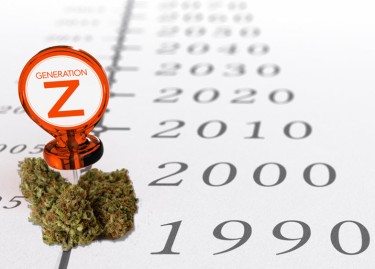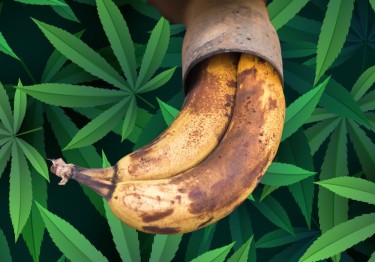Cannabis News
Cannabis Nation – How Daily Cannabis Use Now Outpacing Alcohol Consumption Will Change America (Op-Ed)
Published
7 months agoon
By
admin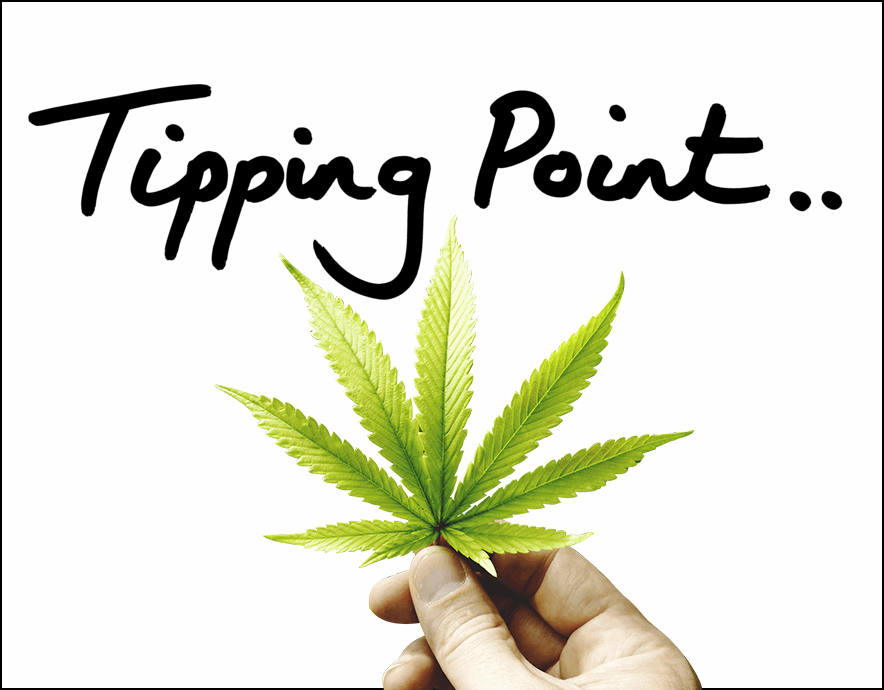
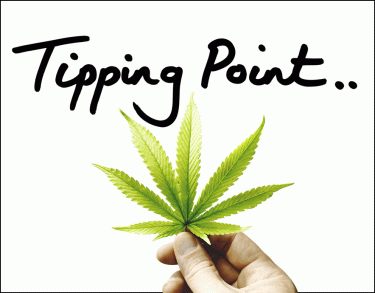
A Nation of Stoners
How Cannabis Outpacing Daily Alcohol Consumption Will Change America
Alright folks, listen up. There’s been a shakeup in the world of substance abuse, and it’s not the kind you’d expect. Looks like good ol’ booze has been kicked off its throne as the king of daily consumption. That’s right, Americans are now more likely to spark up a joint after a long day than they are to crack open a cold one. Or six.
Now, some of you might be thinking, “Hey, what’s the big deal? People are just trading one vice for another.” But hold on a minute. This isn’t just about personal preference. When a whole nation decides to swap out their poison of choice, it’s not just a matter of taste. It’s a fundamental shift in the way we think, act, and interact with the world around us.
Picture this: a country full of stoners. Oh, sure, we might be a little slower to respond and a bit more prone to fits of giggling. But we’d also be a hell of a lot more chill. No more bar fights or drunken brawls. Just a bunch of happy-go-lucky folks content to sit back, munch on some snacks, and ponder the mysteries of the universe.
But hey, maybe that’s just the optimist in me talking. After all, who knows what kind of crazy shenanigans a nation of potheads might get up to? Will we all start wearing patchouli and playing hacky sack? Will we finally achieve world peace, only to forget what we were fighting about in the first place? Or will we just become a bunch of couch potatoes, too entranced by the latest nature documentary to bother with trivial things like work or responsibility?
I guess there’s only one way to find out. So buckle up, my friends. We’re about to embark on a wild ride through the hazy, smoke-filled landscape of a cannabis-loving America.
And who knows?
Maybe we’ll all come out the other side a little bit wiser, a little bit kinder, and a whole lot more mellow. Or maybe we’ll just have the munchies. Either way, it’s gonna be one hell of a trip.
Let’s begin by talking about how one little bean changed the course of human history. That’s right, we’re talking about coffee.
Now, let’s take a step back in time. Imagine a world before Starbucks, before Dunkin’ Donuts, before your fancy French press. In those dark ages, people didn’t have the luxury of a refreshing cup of joe in the morning. No, their go-to beverages were more along the lines of beer, mead, or some other fermented concoction. Why, you ask? Well, let’s just say that the water situation back then was less than ideal. You were more likely to catch a deadly disease from your drinking water than you were to quench your thirst.
So, people resorted to drinking alcohol to stay hydrated. Sounds like a party, right? Well, not so much when you consider the fact that everyone was essentially drunk all the time. I mean, can you imagine trying to be productive when you’re constantly buzzed? It’s a miracle they managed to get anything done at all.
But then, like a beacon of hope in a sea of drunken stupor, along came coffee. Suddenly, people realized that by boiling water, they could kill off all those pesky diseases AND enjoy a beverage that wouldn’t leave them stumbling around like a bunch of buffoons. Plus, as an added bonus, coffee actually made them more alert and focused. It was like a magic elixir for productivity.
And wouldn’t you know it, shortly after this game-changing shift in beverage choices, the industrial revolution kicked off. Coincidence? I think not. With the power of coffee coursing through their veins, people were able to work harder, faster, and smarter than ever before. The world was forever changed, all thanks to a humble little bean.
But here’s the thing: if coffee could have such a profound impact on the course of human history, just imagine what could happen if cannabis becomes the new norm. We’re talking about a substance that not only alters your state of mind but also has the potential to change the way you see the world. Could it lead to a new era of creativity, innovation, and enlightenment? Or will it just turn us all into a bunch of spaced-out, snack-obsessed philosopers?
Ah, the eternal question: “What is a stoner?” It’s a label that’s been thrown around for decades, often accompanied by images of lazy, unmotivated individuals wasting away in their parents’ basements. But the reality is far from this outdated stereotype. Today’s average cannabis consumer is just as likely to be a high-powered lawyer, a soccer mom juggling a hectic schedule, or even your trusted medical professional.
Now, as a self-proclaimed member of the stoner class, I can attest to some common threads that seem to run through the cannabis community. While not every single consumer fits this mold, there are some undeniable trends that emerge when you start to pay attention.
First and foremost, let’s talk politics. You might assume that stoners lean heavily to the left, but the truth is, most of them couldn’t care less about partisan bickering. Their primary concern is seeing cannabis legalized, and they don’t particularly care who gets the job done. This apolitical stance often extends to external conflicts as well. Unless absolutely necessary, most stoners prefer to take a hands-off approach, opting for mediation and diplomacy over aggression.
But it’s not just about avoiding conflict. Stoners also tend to have a heightened sense of empathy for their fellow humans and the environment. They understand the intricate web of connections that binds us all together, and they strive to treat the earth and its inhabitants with respect. This often translates to a love of nature and a desire to protect it.
When it comes to leisure activities, stoners tend to gravitate towards the simple pleasures in life. A nice walk in the park, some soothing tunes, or a creative outlet like art or music – these are the things that bring them joy. They’re not afraid to kick back, relax, and enjoy the moment.
And let’s not forget about food. Stoners appreciate a good meal, and they don’t take themselves too seriously in the process. They understand that life is meant to be savored, one delicious bite at a time.
But don’t let their laid-back demeanor fool you. Stoners can be some of the most responsible, hardworking individuals you’ll ever meet. They tend to take good care of themselves, both physically and mentally, which often leads to fewer sick days and longer, healthier lives. And when it comes to the powers that be, stoners are wise to the fact that corporate interests and government corruption often go hand in hand. They’ve lost faith in the official narrative and instead choose to trust their own instincts and experiences.
Of course, these are all generalizations, and I’ll admit that my own biases may be coloring my perception. But if you take the time to talk to a few stoners yourself, I’m willing to bet their answers will fall somewhere in the same ballpark. The stoner archetype may have evolved over the years, but the core values of empathy, respect, and a love for the simple things in life remain as strong as ever.
Alright, let’s shift our focus to the elephant in the room: alcohol. It’s time to put this seemingly innocuous substance under the microscope and see what kind of ugly truths we can uncover.
Now, I know what you’re thinking. Most people who enjoy a drink or two are perfectly respectable members of society. They’re not out there causing trouble or making a scene. And you’re right. The majority of alcohol consumers are moderate and well-behaved. But here’s the thing: when you look at the cold, hard facts, alcohol starts to look like a pretty horrendous drug.
Let’s start with the big one: violence. According to the FBI’s own database, alcohol is responsible for up to 40% of all violent crimes. That’s a staggering number when you really stop to think about it. And that’s not even taking into account the countless cases of domestic violence and sexual assault that can be traced back to alcohol consumption.
But the toll of alcohol doesn’t stop there. Every year, countless lives are lost to drunk driving accidents. And let’s not forget about the myriad of alcohol-related diseases that claim even more victims. From liver cirrhosis to various types of cancer, alcohol is a silent killer that takes an immense toll on public health.
And then there’s the impact on the mind and body. As a depressant, alcohol can wreak havoc on your mental wellbeing, exacerbating existing conditions and creating new ones. But it’s not just your brain that suffers. Alcohol is an intoxicant that puts stress on virtually every organ in your body, leaving you feeling like a shell of your former self.
Speaking of productivity, good luck getting anything done when you’re under the influence of alcohol. A drunk person is about as useful as a screen door on a submarine. They’re not exactly known for their sharp wit, keen insights, or ability to get things done.
But perhaps the most troubling aspect of alcohol consumption is the way it warps your perception of the world around you. When you’re drunk, you’re wrapped up in your own little bubble of intoxication. Empathy goes out the window, and the needs and feelings of others become secondary to your own desires. It’s a recipe for disaster, both on a personal and societal level.
And let’s not forget the most glaring difference between alcohol and cannabis: the lethal dose. Drink too much alcohol in one sitting, and you could very well end up in a body bag. But no matter how much cannabis you consume, you’ll never face that same risk. Sure, you might end up taking an unplanned nap or raiding the fridge, but death by overdose simply isn’t a concern.
So there you have it. When you strip away the social acceptability and take a hard look at the facts, alcohol starts to look like a pretty dangerous and destructive substance. And yet, it remains legal and widely available, while cannabis continues to face stigma and persecution. Makes you wonder about our priorities as a society, doesn’t it?
Alright, it’s time to wrap this up and get to the sticky bottom line. So, cannabis has officially dethroned alcohol as the substance of choice for daily consumption. And you know what? I think that’s a good thing.
Now, I’m not saying that cannabis is some miracle drug with no downsides. Of course, there will be some unforeseen consequences as this trend continues to unfold. But when you stack it up against alcohol, the benefits seem to outweigh the risks.
Think about it this way: if you were a hiring manager and you had two candidates in front of you – a perpetual drunk who’s always under the influence, and a perpetual stoner who’s always high – who would you choose? I know where I’d place my bet.
The drunk is going to be unreliable, unproductive, and potentially even dangerous. They’ll show up late (if they show up at all), struggle to focus on tasks, and maybe even cause some drama in the workplace. Not exactly a recipe for success.
But the stoner? Sure, they might space out occasionally or take a few extra snack breaks. But overall, they’re going to be far more functional and capable of getting the job done. They’ll be more creative, more empathetic, and less likely to fly off the handle at the slightest provocation.
And that’s just the workplace. Imagine the ripple effects throughout society as a whole. Less violence, fewer accidents, and a greater sense of community and connection. It’s not hard to see how this shift could lead to some pretty positive changes.
Of course, there will be challenges along the way. We’ll need to navigate the legal and social implications of widespread cannabis use. We’ll need to educate people on responsible consumption and make sure that the industry is regulated and controlled.
But at the end of the day, I believe that this move away from alcohol and towards cannabis is a step in the right direction. It’s a chance to rethink our relationship with substances and make choices that prioritize our health, our happiness, and our collective wellbeing.
So let’s embrace this new era of cannabis consumption. Let’s approach it with open minds and a willingness to learn and adapt. And most importantly, let’s remember to pass the joint to the left-hand side. Because in this brave new world, sharing is most definitely caring.
MILLONS PREFER WEED OVER BOOZE, READ ON…
You may like
-


Cannabis Has A History With Christmas
-


5 Cannabis Christmas Recipes to Try This Holiday Season at Home or the Office Party!
-


Cannabis operators report Instagram page ‘shadow bans’ and closures
-


How Interstate Commerce is Driving the Growth of Hemp-Derived Consumer Products
-


The Grinch Stole SAFE Banking from the Cannabis Industry This Christmas, Yet Again!
-
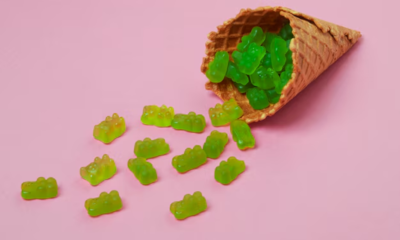

HHC vs. Delta 9: Differences & Similarities
Cannabis News
5 Cannabis Christmas Recipes to Try This Holiday Season at Home or the Office Party!
Published
5 hours agoon
December 23, 2024By
admin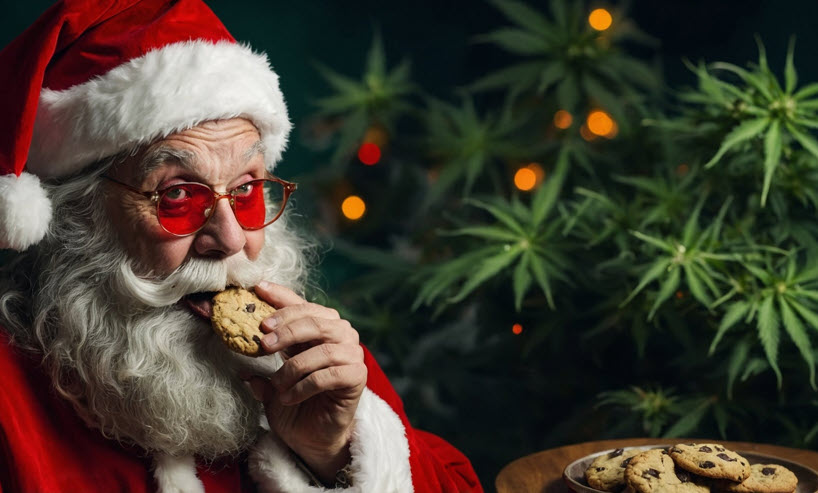

Ah yes, it’s that magical time of year again when Ganja Clause slides down the chimney to visit all the good little stoners. The lights are twinkling, the fire is crackling, and the sweet aroma of cannabis-infused treats fills the air. As someone who’s spent years experimenting with cannabis cuisine, I’ve learned that the holidays present the perfect opportunity to elevate traditional recipes to new heights.
To help make your holidaze more “dazey,” I’ve crafted five festive recipes that combine seasonal favorites with our favorite herb. These dishes aren’t just about getting high – they’re about creating memorable experiences and new traditions. But before we dive in, I need to emphasize something crucial: dosing is always important, and you should NEVER give these recipes to anyone without their explicit consent. While sharing is caring, tricking someone into consuming cannabis is not only unethical but potentially illegal. Always clearly label your infused treats and keep them safely away from children and unsuspecting guests.
With those important notes out of the way, let’s get into these magical recipes that will make your holiday season extra special.
Look, we all know eggnog is a holiday staple, but why not kick it up a notch? This cannabis-infused version will have you feeling jolly in no time. Just remember – this isn’t your grandma’s recipe (unless your grandma is really cool).
What You’ll Need:
-
4 cups milk (or non-dairy alternative if that’s your jam)
-
1 cup heavy cream (or coconut cream for you plant-based folks)
-
6 egg yolks (fresh is best, trust me)
-
1/2 cup sugar
-
1 tsp vanilla extract
-
1/2 tsp ground nutmeg
-
1 tbsp cannabis tincture or cannabis-infused syrup
The Magic Process:
-
Start by heating your milk and cream in a saucepan. You want it hot but not boiling – we’re making eggnog, not scrambled eggs.
-
In a separate bowl, whisk those egg yolks, sugar, and vanilla until they’re well combined and looking smooth.
-
Here’s the tricky part: slowly (and I mean SLOWLY) add the hot milk mixture to your egg mixture while whisking constantly. If you dump it all in at once, you’ll end up with sweet scrambled eggs, and nobody wants that.
-
Pour everything back into your saucepan and cook over medium heat, stirring constantly until it thickens enough to coat the back of a spoon.
-
Remove from heat, stir in that nutmeg, and let it cool a bit before adding your cannabis tincture or syrup.
-
Chill thoroughly before serving.
Pro tip: Start with a small serving – this stuff can creep up on you!
Want to elevate your holiday meal? This gravy will take your feast to new heights. It’s perfect for drowning those mashed potatoes or smothering that turkey.
The Goods:
-
2 cups chicken or vegetable stock
-
1/4 cup all-purpose flour
-
1/4 cup cannabis butter (cannabutter)
-
1/2 tsp salt
-
1/4 tsp black pepper
-
1 tbsp chopped fresh herbs (thyme or rosemary work great)
The How-To:
-
Melt your cannabutter over medium heat in a saucepan. Watch it carefully – burnt butter is not the vibe we’re going for.
-
Whisk in the flour to create your roux. Cook it for about 1-2 minutes to get rid of that raw flour taste.
-
Now, slowly pour in your stock while whisking like your life depends on it. No lumps allowed!
-
Add your seasonings and herbs.
-
Keep stirring and simmering until it reaches your desired thickness.
-
Taste and adjust seasonings if needed (before you get too lifted).
Remember: Label this clearly! You don’t want Aunt Martha accidentally pouring this all over her plate without knowing what’s up.
Forget that canned stuff – this homemade cranberry sauce with a special twist will have everyone at the table asking for seconds (though you might want to limit them to just one serving).
The Ingredients:
Getting Saucy:
-
Toss your cranberries, OJ, and sugar into a saucepan over medium heat.
-
Let it cook until those cranberries start popping like tiny little fireworks (about 10 minutes).
-
Once it’s thickened up nicely, remove from heat.
-
Here comes the fun part – stir in your cannabis-infused honey or tincture.
-
Let it cool completely before serving.
Pro tip: Make two batches – one regular and one infused. Just make sure to label them clearly!
These aren’t your regular sweet potatoes – they’re elevated sweet potatoes. Perfect for getting baked while getting baked.
What You Need:
-
4 large sweet potatoes
-
1/2 cup cannabis butter (cannabutter)
-
1/4 cup brown sugar
-
1 tsp ground cinnamon
-
1/2 tsp ground nutmeg
-
Salt to taste
-
Marshmallows (optional, but highly recommended)
The Method:
-
Preheat your oven to 375°F (190°C).
-
Bake those sweet potatoes until they’re tender (about an hour).
-
Once they’re cool enough to handle, peel and mash them up.
-
Mix in your cannabutter, brown sugar, and spices.
-
Transfer to a baking dish.
-
If you’re feeling extra, top with marshmallows.
-
Bake for another 20-30 minutes until everything’s golden brown and gorgeous.
Warning: These are dangerously delicious – pace yourself!
This warm, spicy cider will lift your spirits in more ways than one. Perfect for those chilly winter nights.
The Essentials:
The Process:
-
Pour your cider into a large pot.
-
Add your cinnamon sticks, cloves, and orange slices.
-
Heat until it just starts to bubble, then reduce to a simmer.
-
Add your cannabis-infused maple syrup (or add tincture to individual cups for controlled dosing).
-
Let everything mingle and get cozy for about 20 minutes.
-
Serve it up warm with an orange slice or cinnamon stick garnish.
Pro tip: Keep a non-infused batch warming for designated drivers and non-partaking guests.
Remember folks, the key to a successful Dankmas feast is clear labeling and careful dosing. Nothing ruins a holiday gathering quite like someone getting unexpectedly zooted. Happy cooking, and may your holidays be dank and delightful!
There you have it, folks – five unique ways to spice up your Dankmas traditions and make the season truly memorable. As someone who’s hosted many cannabis-friendly holiday gatherings, I can’t stress enough the importance of starting slow with these recipes. Edibles can take anywhere from 30 minutes to two hours to fully kick in, and you definitely don’t want to overdo it during family dinner. I strongly recommend doing a test run with different dosages before the big day to find your sweet spot.
What I love most about these recipes is that they offer a fantastic alternative for those looking to skip the traditional alcohol-heavy holiday celebrations. Cannabis provides a more natural way to unwind and connect with loved ones during this special time of year. Plus, you won’t have to worry about a hangover the next morning!
Remember to celebrate responsibly, be open about what’s infused and what isn’t, and most importantly, enjoy the magic of the season. Happy Dankmas to all, and to all a good height!
MORE DANKMAS STORIES, READ ON…
Cannabis News
The Grinch Stole SAFE Banking from the Cannabis Industry This Christmas, Yet Again!
Published
1 day agoon
December 22, 2024By
admin

The landscape of cannabis legislation in the United States has been a complex and evolving issue, particularly concerning banking regulations. As of December 2024, it has become official: the current Congress will not provide any protections for banks that serve state-legal marijuana businesses. This decision has significant implications for the cannabis industry, which continues to grow rapidly despite the lack of federal support. In this article, we will explore the reasons behind this decision, the implications for cannabis businesses, and the broader context of cannabis legalization in America.
The State of Cannabis Legalization
A Growing Industry
The cannabis industry has seen remarkable growth over the past decade. As of late 2024, 23 states and Washington D.C. have legalized recreational marijuana use, while 38 states allow medical marijuana. According to recent estimates, the legal cannabis market in the U.S. is projected to reach over $40 billion by 2025. This growth has been fueled by changing public perceptions of marijuana, increased advocacy for legalization, and significant tax revenues generated by state-legal cannabis sales.
The Banking Dilemma
Despite this rapid expansion, cannabis businesses face unique challenges, primarily due to their inability to access traditional banking services. Federal law classifies marijuana as a Schedule I controlled substance under the Controlled Substances Act. This classification creates a significant barrier for banks and financial institutions that wish to work with cannabis businesses, as they risk federal penalties for facilitating transactions related to an illegal substance.
As a result, many cannabis companies operate on a cash-only basis. This situation not only poses safety risks—such as increased theft and violence—but also limits these businesses’ ability to manage finances effectively, pay taxes electronically, and build credit histories.
Legislative Attempts at Reform
One of the most prominent legislative efforts aimed at addressing these banking issues is the Secure and Fair Enforcement (SAFE) Banking Act. First introduced in 2019, the SAFE Banking Act sought to provide protections for banks that serve legal cannabis businesses by preventing federal regulators from penalizing them for doing so.
The act garnered significant bipartisan support in both the House and Senate. In previous sessions of Congress, it passed multiple times in the House but faced hurdles in the Senate due to opposition from certain lawmakers who were concerned about broader implications of marijuana legalization.
In light of ongoing discussions about federal spending and budgetary priorities, advocates had hoped that some version of the SAFE Banking Act would be included in recent spending bills. However, during negotiations leading up to December 2024, a House committee led by Republicans removed any provisions related to marijuana banking protections from key spending legislation.
This decision reflects a broader trend within Congress where discussions around cannabis reform have become increasingly contentious. While there is still bipartisan support for certain aspects of cannabis legislation—particularly when it comes to medical use—more comprehensive reforms like banking protections have struggled to gain traction.
Implications for Cannabis Businesses
Continued Cash-Only Operations
The removal of banking protections means that many cannabis businesses will continue to operate primarily on a cash basis. This situation presents several challenges:
-
Safety Risks: Cash-only operations make cannabis dispensaries and cultivation facilities prime targets for theft and robber Employees often have to handle large amounts of cash daily, increasing their risk of violence.
-
Operational Inefficiencies: Without access to banking services, businesses cannot easily manage payroll or pay bills electronically. This inefficiency can lead to operational delays and increased costs.
Impact on Public Safety
Advocates argue that providing banking access would enhance public safety by reducing the amount of cash circulating within the community. By allowing cannabis businesses to deposit their earnings into banks, it would minimize the risks associated with cash transactions, making both employees and customers safer.
Moreover, having a transparent financial system would help law enforcement track illicit activities more effectively. Currently, without proper banking oversight, there are concerns that some cash-only operations may be involved in money laundering or other illegal activities.
Politics and Public Opinion
Changing Attitudes Toward Cannabis
Public opinion on marijuana legalization has shifted dramatically over recent years. According to various polls, a significant majority of Americans now support legalizing marijuana for both medical and recreational use. This shift has put pressure on lawmakers to address outdated federal policies regarding cannabis.
Despite this growing acceptance among the public, political divisions remain strong within Congress regarding how best to approach cannabis reform. Some lawmakers advocate for full legalization at the federal level, while others prefer a more cautious approach that prioritizes regulation over outright legalization.
The Role of Advocacy Groups
Advocacy groups play a crucial role in pushing for legislative change regarding cannabis banking protections. Organizations such as the National Cannabis Industry Association (NCIA) and Americans for Safe Access (ASA) have been vocal proponents of reforming banking laws to support state-legal cannabis businesses.
These groups have mobilized public support through campaigns highlighting the safety risks associated with cash-only operations and advocating for policies that promote financial inclusion for cannabis entrepreneurs.
Future Prospects for Cannabis Banking Reform
While current congressional efforts have stalled regarding marijuana banking protections, there are still potential avenues for reform:
-
Incremental Reforms: Rather than pursuing comprehensive federal legislation like the SAFE Banking Act all at once, lawmakers may consider incremental reforms that address specific issues related to banking access without fully legalizing marijuana at the federal level.
The Role of Public Awareness
As public awareness about the challenges faced by cannabis businesses grows, there may be increased pressure on lawmakers to act decisively on this issue. Continued advocacy efforts can help ensure that banking reform remains a priority on Congress’s agenda.
Conclusion
The decision by Congress not to include marijuana banking protections in its current spending bill underscores ongoing tensions surrounding cannabis legislation in America. While public opinion increasingly favors legalization and reform, political divisions continue to hinder progress on critical issues such as banking access for state-legal marijuana businesses.
As the industry continues to grow despite these challenges, stakeholders must remain vigilant in advocating for change while exploring alternative solutions at both state and federal levels. The future of cannabis banking reform remains uncertain; however, with continued advocacy and public support, there is hope that meaningful progress can be made in addressing these pressing issues facing one of America’s fastest-growing industries.
SAFE BANKING SINCE 2018, WHAT A FAILURE, READ ON…
SAFER BANKING ACT FAILS AGAINS, SAME OF BANANA IN THE TAILPIPE!
Cannabis News
HHC vs. Delta 9: Differences & Similarities
Published
3 days agoon
December 20, 2024By
admin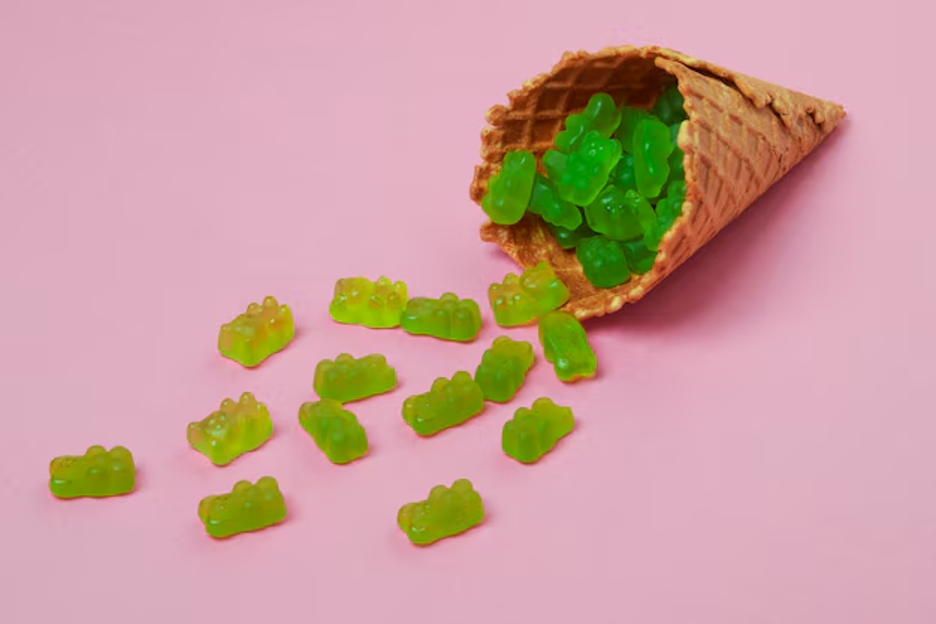

Cannabis has so many compounds, and two that have been making the rounds lately are HHC and Delta 9 THC. They’re not the same thing, even though they’re both cannabinoids that interact with the body’s endocannabinoid system. Some people want a mild, steady experience, while others might be looking for something more intense. Understanding these two can help you figure out what’s right for you.
What Is HHC?
HHC, short for hexahydrocannabinol, is a hydrogenated version of THC. It’s not something you’d find naturally in large amounts in cannabis plants. Instead, it’s made through a process that adds hydrogen molecules to THC. The result? A more stable compound that’s less prone to breaking down when exposed to heat or UV light.
How HHC Is Made
Think of it like a science experiment. HHC is usually created in a lab by taking Delta 9 or Delta 8 THC and using hydrogenation—basically, combining it with hydrogen under pressure and in the presence of a catalyst. This process changes its structure while keeping its effects somewhat similar to THC.
Common Uses and Effects of HHC
People who use HHC say it’s somewhere between Delta 8 and Delta 9 in terms of effects. It’s often described as relaxing but without being overly sedative. You might feel a light buzz, reduced stress, or mild euphoria. Some even claim it helps with discomfort or improving sleep, but solid research is still catching up. Since it’s less potent than Delta 9, it’s often favored by those who want a manageable experience without the strong psychoactive punch.
If you’re interested in trying HHC and Delta 9 for yourself, check out their wide range of products at trycandycloud.com. They’ve got everything from gummies to disposable vapes, all crafted for a smooth experience.
What Is Delta 9 THC?
Delta 9 THC is the main psychoactive compound in cannabis. It’s the reason you feel “high” when you use weed. Chemically speaking, Delta 9 has a double bond in its ninth carbon chain, which plays a big role in how it interacts with your brain.
Natural Occurrence in Cannabis
This one is straightforward: Delta 9 is found in high concentrations in marijuana plants. It’s what most people think of when they hear “THC.” Unlike HHC, there’s no need for a lab process—it’s already there. Hemp plants, however, contain much lower levels of Delta 9 THC, which is why it’s primarily extracted from marijuana.
Common Uses and Effects of Delta 9 THC
The effects of Delta 9 are well-documented. Depending on the dose, you might feel euphoria, increased appetite, or deep relaxation. For medical users, it’s often used to manage chronic pain, nausea, and other conditions. It’s also been studied for its potential benefits in anxiety relief, though higher doses might have the opposite effect, causing paranoia. Delta 9 THC is versatile, but it’s not without its risks, particularly for new users or those sensitive to its psychoactive effects.
Key Differences Between HHC and Delta 9 THC
Chemical Structure and Composition
The main difference is in their structure. Delta 9 THC has that iconic double bond, while HHC’s hydrogenation makes it more stable. This difference might not mean much to the average person, but it’s why HHC is less likely to degrade over time.
Potency Levels
Delta 9 THC is generally more potent. HHC might require a higher dose to get a comparable effect, but some people prefer its lighter touch. Potency differences can also depend on the method of consumption, with edibles typically providing a stronger, longer-lasting effect compared to vaping or smoking.
Duration of Effects
Both last a few hours, but some users report that HHC’s effects fade more gradually. Delta 9, on the other hand, can have a sharper comedown. HHC’s gradual fade makes it appealing for those who want a smooth end to their experience.
Benefits and Drawbacks of HHC and Delta 9 THC
HHC: Pros and Cons
Pros:
- More stable, so it lasts longer on the shelf.
- Effects are milder, making it less overwhelming for beginners.
- Can be a functional option for daytime use.
Cons:
- Limited research, so we don’t know its full impact yet.
- Availability can be hit or miss depending on where you live.
- Legal gray area in many regions.
Delta 9 THC: Pros and Cons
Pros:
- Well-studied with established medical uses.
- Widely available in areas where cannabis is legal.
- Stronger effects make it ideal for experienced users or those with high tolerance.
Cons:
- Higher chance of side effects like anxiety.
- More likely to show up on drug tests.
- Shorter shelf life compared to HHC.
Frequently Asked Questions (FAQ)
Q. Is HHC safer than Delta 9 THC?
Not enough research exists to say definitively, but HHC’s milder effects might make it feel safer to some users.
Q. Will HHC or Delta 9 THC show up on a drug test?
Yes, both can potentially show up on a drug test, so use with caution if that’s a concern.
Q. Which one is better for recreational use?
That depends on your preferences. HHC is great for a mellow time, while Delta 9 is better if you’re looking for something more intense.
HHC vs. Delta 9: Choosing the Right One for You
The choice comes down to what you’re after. If you want a milder, more laid-back experience, HHC might be a good option. On the other hand, if you’re looking for something stronger or need it for medical reasons, Delta 9 is the way to go. It also depends on what’s legal and available where you are. And always consider your tolerance levels and experience before diving in. If you’re unsure, consult with a knowledgeable dispensary staff.
Resources:

Cannabis Has A History With Christmas

5 Cannabis Christmas Recipes to Try This Holiday Season at Home or the Office Party!

Cannabis operators report Instagram page ‘shadow bans’ and closures

How Interstate Commerce is Driving the Growth of Hemp-Derived Consumer Products

The Grinch Stole SAFE Banking from the Cannabis Industry This Christmas, Yet Again!

HHC vs. Delta 9: Differences & Similarities
DOJ Asks Federal Court To Deny Doctors’ Lawsuit Over Marijuana Rescheduling Hearing To Avoid ‘Undue Delay’

What Federally Illegal Drug Has Created Almost $10 Billion in Sales Tax Revenue for States in the Last 40 Months?

Three Wise Men Give Marijuana Strain Gift Suggestions

Tasmanian Hemp Assoc Bids Goodbye To Australian Hemp Council

Distressed Cannabis Business Takeaways – Canna Law Blog™

United States: Alex Malyshev And Melinda Fellner Discuss The Intersection Of Tax And Cannabis In New Video Series – Part VI: Licensing (Video)

What you Need to Know

Drug Testing for Marijuana – The Joint Blog

NCIA Write About Their Equity Scholarship Program

It has been a wild news week – here’s how CBD and weed can help you relax

Cannabis, alcohol firm SNDL loses CA$372.4 million in 2022

A new April 20 cannabis contest includes a $40,000 purse

Your Go-To Source for Cannabis Logos and Designs

UArizona launches online cannabis compliance online course
Trending
-

 Cannabis News2 years ago
Cannabis News2 years agoDistressed Cannabis Business Takeaways – Canna Law Blog™
-

 One-Hit Wonders2 years ago
One-Hit Wonders2 years agoUnited States: Alex Malyshev And Melinda Fellner Discuss The Intersection Of Tax And Cannabis In New Video Series – Part VI: Licensing (Video)
-

 Cannabis 1012 years ago
Cannabis 1012 years agoWhat you Need to Know
-

 drug testing1 year ago
drug testing1 year agoDrug Testing for Marijuana – The Joint Blog
-

 Education2 years ago
Education2 years agoNCIA Write About Their Equity Scholarship Program
-

 Cannabis2 years ago
Cannabis2 years agoIt has been a wild news week – here’s how CBD and weed can help you relax
-

 Marijuana Business Daily2 years ago
Marijuana Business Daily2 years agoCannabis, alcohol firm SNDL loses CA$372.4 million in 2022
-

 California2 years ago
California2 years agoA new April 20 cannabis contest includes a $40,000 purse



